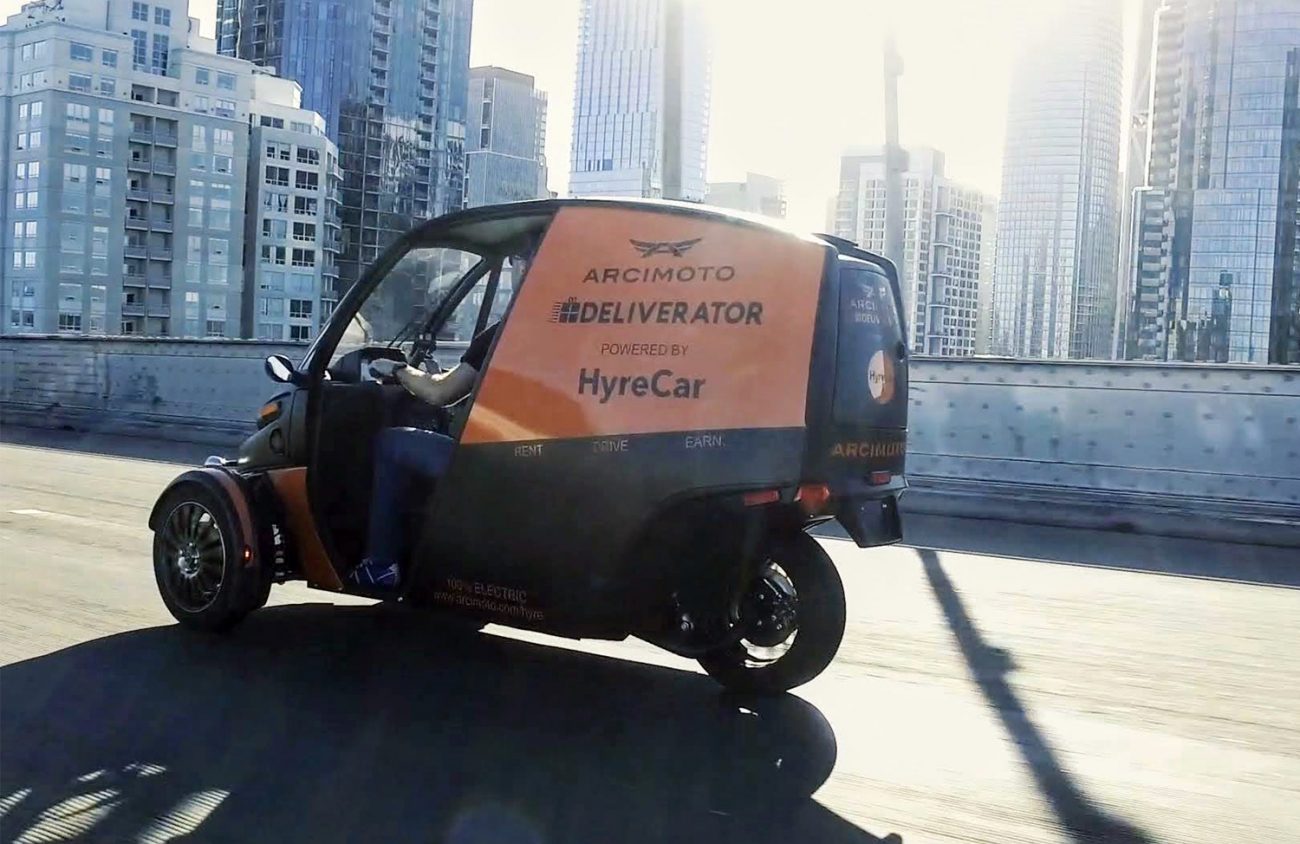From Wall Street to the delivery world, Arcimoto is seeing success during the sluggish COVID-19 economy. And CEO and founder Mark Frohnmayer has his sights on a federal loan program that helped catapult Tesla into its out-of-this world popularity.
The COVID-19 economy at first hit Arcimoto hard. When the virus came to the U.S., the company announced March 19 that it would suspend production of its Fun Utility Vehicle (FUV), the company’s everyday-use three-wheel vehicle. But the company then received a PPP loan, which Frohnmayer says helped the company bring back many of its laid-off production staff. The company’s current labor force is almost as strong as it was pre-COVID, he adds.
Although the pandemic has forced many businesses and industries to rethink their place in a socially distanced world, one area that has prospered is delivery services. And for Arcimoto’s Deliverator, which had its first pilot vehicle produced mid-March, now is the time to try it out in the real world.
“Last mile delivery just went to the moon,” he says. “Delivery has gone from being a convenience to being actually an essential part of health and safety for a lot of people.”
The three-wheel vehicle, as its name says, is used for last-mile delivery — the final stretch that links business or restaurant to consumer. Although it’s small (three vehicles can fit in a parking space), it can travel up to 75 miles per hour and has a storage space of 20-plus cubic feet, according to Arcimoto’s webpage on the vehicle.
On June 22, the company announced that the Deliverator would hit the streets of Los Angeles as part of a pilot program with HyreCar — an on-demand car rental service for gig workers of Uber, Lyft or grocery delivery apps.
In total, Frohnmayer says Arcimoto has one Deliverator in Eugene, two in Los Angeles, one in Florida and two more planned for somewhere on the West Coast.
“As we refine the product for production, which we’re aiming for the end of this year, we have a lot of feedback from real delivery drivers doing real deliveries of different kinds of things,” he says.
Arcimoto’s introduction of the Deliverator, as well as the Rapid Responder, changed the perception on Wall Street that the company was just about the Fun Utility Vehicle, Frohnmayer says. And investors are growing more aware that electric vehicles are the future of transportation, which is the reason why companies like Tesla and Workhorse have had “hockey stick” growth during the pandemic, he adds.
But another element in Arcimoto’s rising stock-market success comes from millennials trading on an investing app called Robinhood. He says so-called “retail investors” — nonprofessional individuals trading stocks at small amounts — have had an impact on the company’s stock price.
Data from Robintrack, a website that tracks how many Robinhood users buy a particular stock, shows a recent upward trend in the number of users buying Arcimoto. On July 14, according to the website, 13,840 Robinhood users were holding Arcimoto shares, a steep increase from a month ago when the number was 4,789.
Frohnmayer says the company’s focus right now is catching up with FUV orders, getting pilot programs started and planning how to do higher scale production in 2021.
The company has had three stock offerings in the past month and a half, which have raised $26.5 million. It’s a step toward securing a large federal loan of the kind that helped set Tesla on its skyrocket trajectory. Frohnmayer says the company is planning to apply for the Advanced Technology Vehicle Manufacturing loan, which in 2010 awarded Tesla with $465 million.
“We’re now approaching the point where we’d be an ideal candidate for that program,” Frohnmayer says.
Henry Houston is a millennial who bought shares of Arcimoto on the Robinhood app back in January.
A Note From the Publisher

Dear Readers,
The last two years have been some of the hardest in Eugene Weekly’s 43 years. There were moments when keeping the paper alive felt uncertain. And yet, here we are — still publishing, still investigating, still showing up every week.
That’s because of you!
Not just because of financial support (though that matters enormously), but because of the emails, notes, conversations, encouragement and ideas you shared along the way. You reminded us why this paper exists and who it’s for.
Listening to readers has always been at the heart of Eugene Weekly. This year, that meant launching our popular weekly Activist Alert column, after many of you told us there was no single, reliable place to find information about rallies, meetings and ways to get involved. You asked. We responded.
We’ve also continued to deepen the coverage that sets Eugene Weekly apart, including our in-depth reporting on local real estate development through Bricks & Mortar — digging into what’s being built, who’s behind it and how those decisions shape our community.
And, of course, we’ve continued to bring you the stories and features many of you depend on: investigations and local government reporting, arts and culture coverage, sudoku and crossword puzzles, Savage Love, and our extensive community events calendar. We feature award-winning stories by University of Oregon student reporters getting real world journalism experience. All free. In print and online.
None of this happens by accident. It happens because readers step up and say: this matters.
As we head into a new year, please consider supporting Eugene Weekly if you’re able. Every dollar helps keep us digging, questioning, celebrating — and yes, occasionally annoying exactly the right people. We consider that a public service.
Thank you for standing with us!

Publisher
Eugene Weekly
P.S. If you’d like to talk about supporting EW, I’d love to hear from you!
jody@eugeneweekly.com
(541) 484-0519
